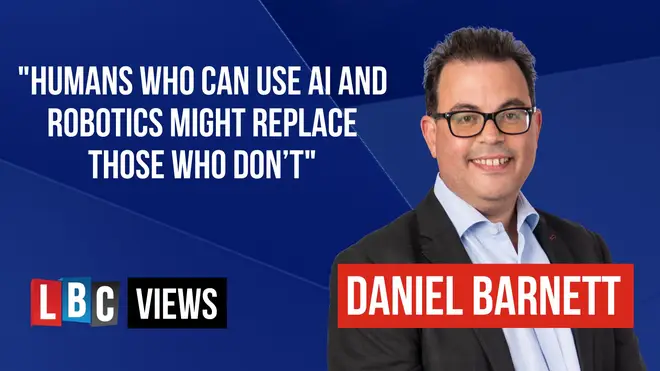
Iain Dale 7pm - 10pm
19 May 2023, 12:04 | Updated: 25 July 2023, 11:51

Emerging from the realms of science fiction into the reality of our daily lives, Artificial Intelligence (AI), which includes sophisticated language models like ChatGPT, is transforming the way we work, communicate and learn.
Doctors are using AI to make better diagnoses and treatment plans, helping patients get well faster.
In my own world, law, AI is used to examine contracts for missing clauses or loopholes, and to find important information in heaps of documents.
AI is altering the educational landscape. EdTech startups are harnessing the power of AI to provide personalised learning experiences, increasing student engagement and performance.
You know how a teaching assistant helps answer pupils’ questions in school? Now, there are chatbots that do the same thing.
But there are real dangers. Companies might use more machines to save money and let go of some people - just look at the robots taking orders at McDonald's.
A government research paper suggests that while there is unlikely to be a major impact on employment in the next five years, there could be substantial impact over the next 10-20 years.
Listen and subscribe to Unprecedented: Inside Downing Street on Global Player
Chat GPT is the best known example of AI. It's really good at creating text that sounds like it's written by a person, based on the questions (known as ‘prompts’ it receives.
Students are already using it for essays, and it has already passed the US Bar Exam. Because the output is different every single time, it is difficult to spot.
The problem with Chat GPT is that it has the knowledge of the entire world at its fingertips. As well as learning from all the very clever stuff on the internet, it also gets information from the very stupid stuff on the internet, including conspiracy sites and extreme political platforms.
It has no judgment and can’t tell the difference between Da Vinci's designs and the doodles of a drunken donkey. So mistakes creep in, and the stuff it produces – although jaw-dropping – does need a human to check it carefully.
If you’re looking for somewhere to start, go to https://chat.openai.com/, register for a free account, and have a play around with Chat GPT.
AI and robotics will never replace humans. But humans who can use AI and robotics might replace those who don’t.